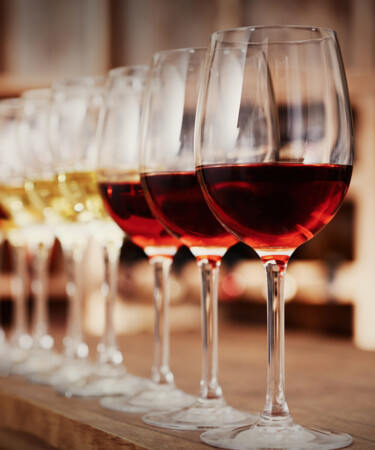It’s the picture of summer: the sun is out, shades are on, barbecue is sizzling, and it’s time to stretch out in the lounge chair with a refreshing glass of…red wine? The warm weather months can be tough on red wine lovers, who might not be able to stomach a glass of their favorite rich Cabernet or Malbec when they’re already sweating from the heat. There’s a simple solution: drink white wine. We know, we know, you despise white wine! It’s thin, tart, and unsatisfying. But perhaps you’ve merely been trying the wrong whites… until now!
Overall, good “transition” white wines for red lovers tend to be fuller-bodied, a touch lower in acidity, and more textured. A touch of oak or oxidative aging doesn’t hurt either, as these are techniques often used to make red wines. To make it easier, here’s a white wine guide for red wine drinkers – a translator, if you will, from reds to their white wine comparisons. Who knows – by the time Labor Day hits, those red wine devotees may not want to go back!
If You Like Pinot Noir, Try: Chardonnay From Around The World
They say what grows together, goes together, and where Pinot Noir grows, so often does Chardonnay. Both grapes come in a range of styles, so whatever style Pinot Noir you gravitate towards, there exists a Chardonnay counterpart. Fans of the light, fresh, and earthy side of Pinot Noir should look to white Burgundy, which tends to have some richness but is mineral and citrus-driven. For those who prefer a rounder, fruitier style of Pinot Noir, California is the way to go; rich, buttery, and often seasoned with the vanilla-toast flavors of new oak, it’ll pack the punch that red wine drinkers are used to.
If You Like Cabernet Sauvignon Or Merlot, Try: California Sauvignon Blanc
While Cabernet Sauvignon and Merlot are two different grapes, they are from the same Bordeaux grape family and therefore, share some similarities. They tend to be full-bodied, deeply fruited, have a characteristic green note, and are often oaked. They also share characteristics with a white grape in their Bordeaux family: Sauvignon Blanc. While light, citrusy versions of Sauvignon Blanc from Sancerre or New Zealand may be too light for most red wine lovers, California winemakers are making excellent, richer styles of Sauvignon Blanc. It’s all in the family!
If You Like Italian Reds, Try: Savennières
From Brunello di Montalcino to Barolo to Chianti, Italian reds vary greatly in style, but there are a few things that they tend to have in common: body, tannic structure, and acid. While some Italian whites might convert Italian red lovers, these red drinkers are more likely to be converted by taking a trip over to the Loire Valley to try a unique style of Chenin Blanc called Savennières. Here, uber-ripe grapes are harvested late and fermented dry, producing unctuous, full-bodied, complex wines that retain Chenin Blanc’s characteristically high acidity. The flavors of Savennières are also quite distinctive and develop with time, not unlike Italy’s classic reds; think notes of yellow fruit, hay, honey, and smoky minerality.
If You Like Rioja, Try: Rhône Whites Or New World Viognier
Rioja, with its characteristic notes of sweets, suntan-lotion-reminiscent coconut, dill, and ripe red fruit, is a remarkably aromatic and complex wine. And sure, Rioja makes white wine too, but why not take this opportunity to explore wines from an entirely new country? White wines from the Rhône, typically made from the grapes Viognier, Marsanne, Roussanne, and Grenache Blanc, tend to be full-bodied and quite aromatic, with ripe stone fruit, spice, herbs, and floral aromas. Rioja lovers will also love New World versions of Rhône whites, such as the intense, often oaked Viogniers of California. It’s all the oaky, hedonistic richness you know and love, just in a slightly different package.
If You Like Malbec, Try: Portuguese Whites
Ah, Malbec, the ripe, black-fruited darling from Argentina. Full-bodied and easy-drinking, Malbec is the go-to red for many red wine lovers, who hold the grape fiercely close to their hearts. These Malbec devotees are used to lush fruit and elevated body and alcohol, so they need white wines from a warm – even hot – climate. Enter Portugal, where, in the central and southern parts of the country, the hot summer sun ripens grapes fully, creating big, bold, full-fruited wines that still manage to be refreshing. Look for textured Encruzado wines from the more northerly Dão region and branco blends from the warm, inland Alentejo.
If You Like Fun And Funky Reds, Try: Skin-Contact (“Orange”) Wines
You know who you are, lovers of the off-beat and obscure! Those who think that “barnyard” aromas in wine are positives, know what the grapes Pineau d’Aunis and Trousseau are, or can name a list of natural wine producers off the top of their heads probably qualify for this category. It doesn’t get funkier for white wine than whites that have an entirely different color, aka orange wines. These are white wines that are fermented like red wines, in which the juice sees extended contact with the grape skins, giving the wine color, texture, and a plethora of non-fruit flavors like apple cider, and rustic earth. Orange wines are common in traditional winemaking regions such as Slovenia and Friuli, but with the popularity of the style, some interesting American examples can be found as well.
